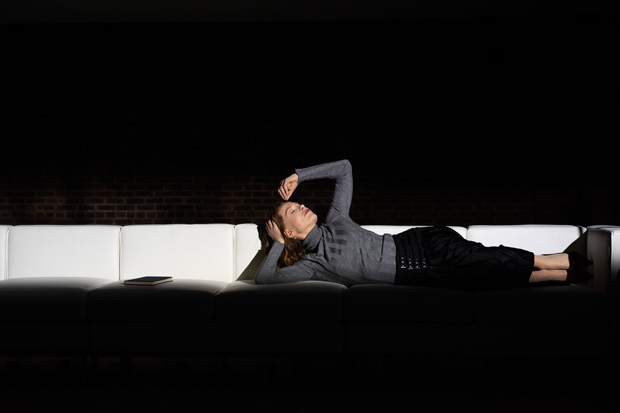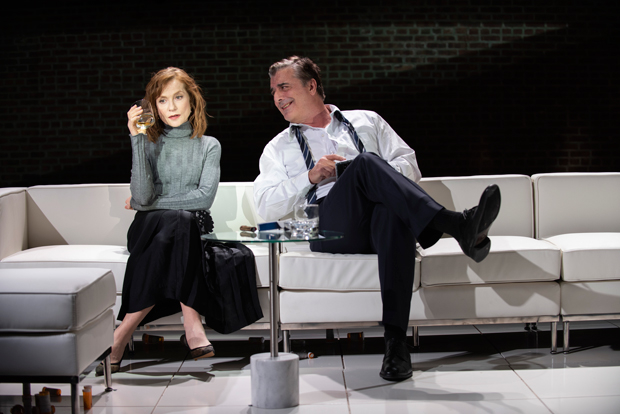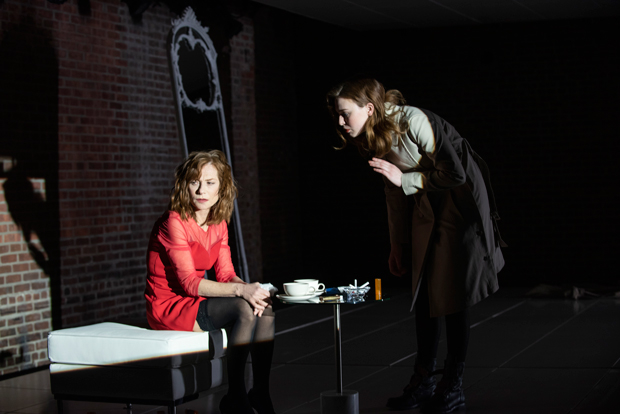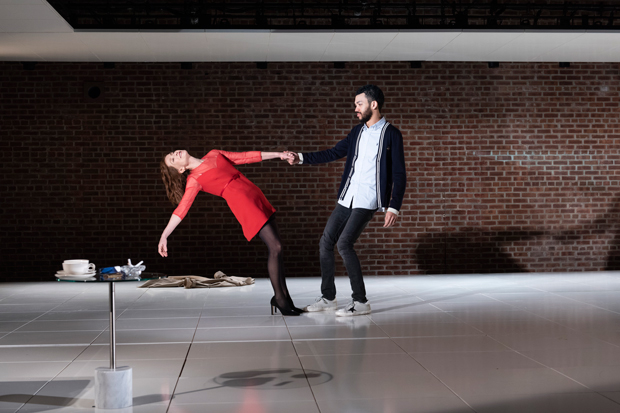Isabelle Huppert Plays a Matriarch in Decline in The Mother
The Atlantic Theater Company presents the US premiere of Florian Zeller’s psychological domestic drama.

(© Ahron R. Foster)
"What was all that for?" So asks Anne (Isabelle Huppert) at the end of French playwright Florian Zeller's play The Mother, making its New York premiere in a translation by Christopher Hampton and a production directed by Trip Cullman. She's broadly referring to motherhood, in particular the emptiness a woman might feel when her children have flown the coop and she now finds herself bereft of purpose. The question could also be directed at Zeller's play itself, which aims to be a psychologically incisive look at a middle-aged mother's clinical depression, but never fully delivers the searing poignancy we expect.
That's no fault of Huppert, who brings her characteristic fearlessness to the part of a mother who rebels against the existential anxiety that has engulfed her as she suspects her husband Peter (Chris Noth) of cheating on her, laments her son Nicolas's (Justice Smith) physical and emotional distance from her, and expresses her jealousy toward the girlfriend (Odessa Young) who now occupies her son's attentions. Though Huppert towers over the rest of the cast, Noth, Smith, and Young do offer colorful support in their relatively limited roles.

(© Ahron R. Foster)
The Mother comes on the heels of Zeller's The Father, which was written after The Mother but was given its US premiere in a 2016 Manhattan Theatre Club Broadway production, starring Frank Langella as a patriarch suffering from dementia (a third play in this loose familial trilogy, The Son, just completed a run at the Kiln Theatre in London). Both plays attempt to get inside the heads of their title characters, putting us right inside their mental illnesses. In the case of The Mother, Zeller's scenes play back on themselves, with one version of a scene offering what could be interpreted as Anne's own abrasive wish-fulfillment version of the other. And under Trip Cullman's direction, characters and objects sometimes have a tendency to uncannily appear out of nowhere either onstage or on the sides of the audience space.

(© Ahron R. Foster)
Otherwise, Cullman's direction remains rather prosaic throughout, exemplified by Lucy Mackinnon's projections, which consist primarily of numbers written out in French to delineate scenes, with numbers repeated to indicate a variation of the scene we've just seen. Mark Wendland's tomblike set sticks mostly to a white color scheme, with only the theater's brown brick back wall offering any kind of relief from the monotony. Costume designer Anita Yavich dresses the characters in conservative black, white, and grey attire throughout, making the one red dress Anne wears in the play's second half — her desperate bid to recapture a sliver of her lost youth — stand out in full glowing relief. Ben Stanton's lighting is notable for its sense of glaring fluorescent normalcy, except during the occasions when it shines dramatic spotlights on certain performers in introspective moments. And sound designer and composer Fitz Patton's main contributions to this landscape of Anne's depressive mind are moments of jittery electronic noise that sound like something out of a David Fincher film like Fight Club and Panic Room.
To be fair, there's only so much inventive stagecraft to bring to a play that remains stubbornly cerebral, for all its devastating subject matter. Even its blurring-fantasy-and-reality conceit feels less like a convincingly organic depiction of mental illness than an academic's intellectualized approximation of it. Worse, once you grasp its structural gimmick early on, dramatically speaking, there's nowhere left for The Mother to go but down, and Zeller doesn't offer many surprises beyond passing suggestions of incestuous feelings on Anne's part toward her son. Huppert does her best to bring emotional heft to this puzzle box, and occasionally Zeller hints at uncomfortable truths about the way housewives like Anne are often shamefully taken for granted by society at large. Overall, though, the cumulative effect of The Mother is like watching a slow-motion car wreck: at times fascinating to gawk at, but leaving us none the wiser as we drive by.

(© Ahron R. Foster)








